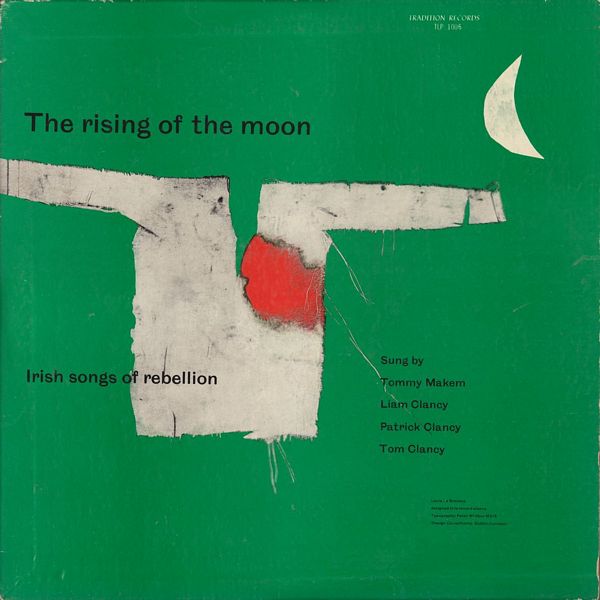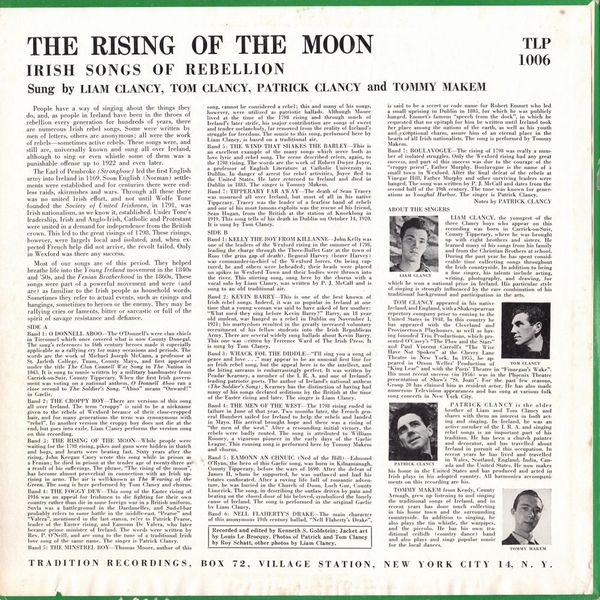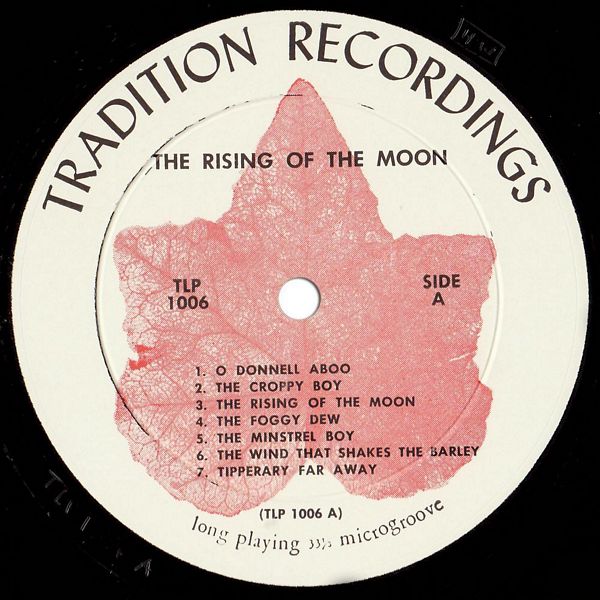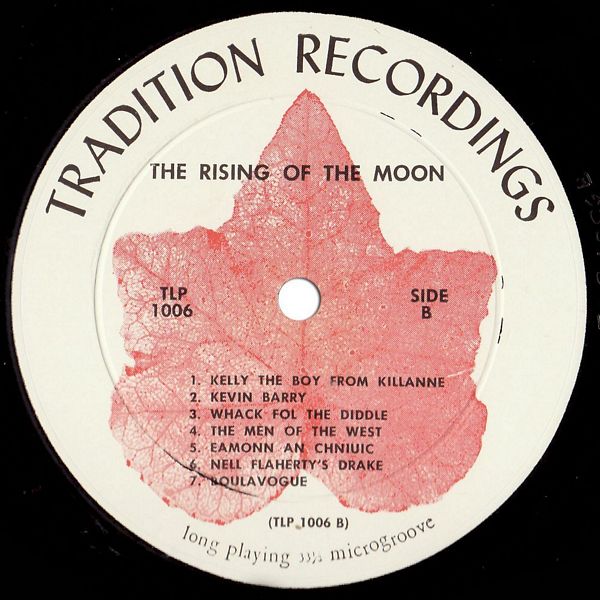

 |


 |
Sleeve Notes
People have a way of singing about the things they do, and, as people in Ireland have been in the throes of rebellion every generation for hundreds of years, there are numerous Irish rebel songs. Some were written by men of letters, others are anonymous; all were the work of rebels — sometimes active rebels. These songs were, and still are, universally known and sung all over Ireland, although to sing or even whistle some of them was a punishable offense up to 1922 and even later.
The Earl of Pembroke (Strongbow) led the first English army into Ireland in 1169. Soon English (Norman) settlements were established and for centuries there were endless raids, skirmishes and wars. Through all these there was no united Irish effort, and not until Wolfe Tone founded the Society of United Irishmen, in 1791, was Irish nationalism, as we know it, established. Under Tone's leadership, Irish and Anglo-Irish, Catholic and Protestant were united in a demand for independence from the British crown. This led to the great risings of 1798. These risings, however, were largely local and isolated, and, when expected French help did not arrive, the revolt failed. Only in Wexford was there any success.
Most of our songs are of this period. They helped breathe life into the Young Ireland movement in the 1840s and '50s, and the Fenian Brotherhood in the 1860s. These songs were part of a powerful movement and were (and are) as familiar to the Irish people as household words. Sometimes they refer to actual events, such as risings and hangings, sometimes to heroes or the enemy. They may be rallying cries or laments, bitter or sarcastic or full of the spirit of savage resistance and defiance.
O DONNELL ABOO — The O'Donnell's were clan chiefs in Tirconnel which once covered what is now County Donegal. The song's references to 16th century heroes made it especially applicable as a rallying cry for many occasions and periods. The words are the work of Michael Joseph McCann, a professor at St. Jarleth College, Tuam, County Mayo, and first appeared under the title The Clan Connell War Song in The Nation in 1843. It is sung to music written by a military bandmaster from Carrick-on-Suir, County Tipperary. When the first Irish government was voting on a national anthem, O Donnell Aboo ran a close second to The Soldier's Song. "Aboo" means "Onward!" in Gaelic.
THE CROPPY BOY — There are versions of this song all over Ireland. The term "croppy" is said to be a nickname given to the rebels of Wexford because of their close-cropped hair, and for many generations the term was synonymous with "rebel". In another version, the croppy boy does not die at the end, but goes into exile. Liam Clancy performs the version sung on this recording.
THE RISING OF THE MOON — While people were waiting for the 1798 rising, pikes and guns were hidden in thatch and bogs, and hearts were beating fast. Sixty years after the rising, John Keegan Casey wrote this song while in prison as a Fenian; he died in prison at the tender age of twenty-three as a result of his sufferings. The phrase, "The rising of the moon", has become almost proverbial in connection with an Irish uprising in arms. The air is well-known as The Wearing of the Green. The song is here performed by Tom Clancy and chorus.
THE FOGGY DEW — This song of the Easter rising of 1916 was an appeal for Irishmen to die fighting for their own country rather than die in some foreign war in a British uniform. Suvla was a battleground in the Dardanelles, and Sud-el-bar probably refers to some battle in the middle-east. "Pearse" and "Valera", mentioned in the last stanza, refer to Patrick Pearse, leader of the Easter rising, and Eamonn De Valera, who later became prime minister of Ireland. The words were written by Rev. P. O'Neill, and are sung to the tune of a traditional Irish love song of the same name. The singer is Patrick Clancy.
THE MINSTREL BOY — Thomas Moore, author of this song, cannot be considered a rebel; this and many of his songs, however, were utilized as patriotic ballads. Although Moore lived at the time of the 1798 rising and through much of Ireland's later strife, his major Contribution are songs of sweet Bad tender melancholy, far removed from the reality of Ireland's draggle for freedom. The music to this song, performed here by Liam Clancy, is based on a traditional air.
THE WIND THAT SHAKES THE BARLEY — This an excellent example of the many songs which serve both as love lyric and rebel song. The scene described refers, again, to the 1798 rising. The words are the work of Robert Dwyer Joyce, a professor of English Literature at Catholic University in Dublin. In danger of arrest for rebel activities, Joyce fled to the United States. He later returned to Ireland and died in Dublin in 1883. The singer is Tommy Makem.
TIPPERARY FAR AWAY — The death of Seán Tracey was mourned all over Ireland, but most of all in his native Tipperary. Tracey was the leader of a fearless band of rebels and one of his most famous exploits was the rescue of his friend, Seán Hogan, from the British at the station of Knocklong in 1919. This song tells of his death in Dublin on October 14, 1920. It is sung by Tom Clancy.
KELLY THE BOY FROM KILLANNE — John Kelly was one of the leaders of the Wexford rising in the summer of 1798, leading the charge through the Three-Bullet Gate at the town of Ross (the grim gap of death). Begneal Harvey (brave Harvey) was commander-in-chief of the Wexford forces. On being captured, he and others were beheaded; their heads were placed on spikes in Wexford Town and their bodies were thrown into the river. This stirring song, sung here by the chorus with a vocal solo by Liam Clancy, was written by P. J. McCall and is to an old traditional air.
KEVIN BARRY — This one of the best known of rebel songs. Indeed, it was so popular in Ireland at one time that a young woman was said to have asked of her mother: "What used they sing before Kevin Barry?" Barry, an 18 year old student, was hanged as a rebel in Dublin on November 1, 1921; his martyrdom resulted in the greatly increased voluntary recruitment of his fellow students into the Irish Republican Army. There are several widely sung ballads about Kevin Barry. This one was written by Terrence Ward of The Irish Press. It is sung by Tom Clancy.
WHACK FOL THE DIDDLE — "I'll sing you a song of peace and love . . ." may appear to be an unusual first line for an Irish rebel song, but the appeal here is to the intellect, and the biting sarcasm is embarrassingly perfect. It was written by Peadar Kearney, a member of the I. R. A. and one of Ireland's leading patriotic poets. The author of Ireland's national anthem (The Soldier's Song), Kearney has the distinction of having had many of his songs declared seditious by the British at the time of the Easter rising and later. The singer is Liam Clancy.
THE MEN OF THE WEST — The 1798 rising ended in failure in June of that year. Two months later, the French general Humbert sailed for Ireland to help the rebels and landed in Mayo. His arrival brought hope and there was a rising of "the men of the west." After a resounding initial victory, the rebels were badly routed. The song is attributed to William Rooney, a vigorous pioneer in the early days of the Gaelic League. This rousing song is performed here by Tommy Makem and chorus.
EAMONN AN CHNUIC (Ned of the Hill) — Edmond O'Ryan, the hero of this Gaelic song, was born in Kilnamanagh, County Tipperary, before the wars of 1690. After the defeat of Junes II, whom he supported, he was outlawed and had his estates confiscated. After a roving life full of romantic adventure, he was buried in the Church of Doon, Loch Gur, County Limerick. The song, in describing the outlaw driven by pain and beating on the closed door of his beloved, symbolized the lonely cause of Ireland. The song is performed in the original Gaelic by Liam Clancy.
NELL FLAHERTY'S DRAKE — The main character of this anonymous 19th century ballad, "Nell Flaherty's Drake", is said to be a secret or code name for Robert Emmett who led a small uprising in Dublin in 1803, for which he was publicly hanged. Emmett's famous "speech from the dock", in which he requested that no epitaph for him be written until Ireland took her place among the nations of the earth, as well as his youth and exceptional charm, assure him of an eternal place in the hearts of all Irish nationalists. The song is performed by Tommy Makem.
BOULAVOGUE — The rising of 1798 was really a number of isolated struggles. Only the Wexford rising had any great success, and part of this success was due to the courage of the "croppy priest", Father Murphy. Boulavogue is the name of a small town in Wexford. After the final defeat of the rebels at Vinegar Hill, Father Murphy and other surviving leaders were hanged. The song was written by P. J. McCall and dates from the second half of the 19th century. The tune was known for generations as Youghal Harbor. The singer is Patrick Clancy.
Notes by PATRICK CLANCY
ABOUT THE SINGERS
LIAM CLANCY, the youngest of the three Clancy boys who appear on this recording was born in Carrick-on-Suir, County Tipperary, where he was brought up with eight brothers and sisters. He learned many of his songs from his family and from the Christian Brothers at school. During the past year he has spent considerable time collecting songs throughout the Irish countryside. In addition to being a fine singer, his talents include acting, writing, photography, and drawing, for which he won a national prize in Ireland. His particular style of singing is strongly influenced by the rare combination of his traditional background and participation in the arts.
TOM CLANCY appeared in his native Ireland, and England, with a Shakespearean repertory company prior to coming to the United States in 1948. In this country he has appeared with the Cleveland and Provincetown Playhouses, as well as having founded Trio Productions, which presented O'Casey's "The Plow and the Stars" and Paul Vincent Carroll's "The Wise Have Not Spoken" at the Cherry Lane Theatre in New York. in 1955, he appeared in Orson Welles' Production of TOM CLANCY "King Lear" and with the Poets' Theatre in "Finnegan's Wake". His most recent success (in 1956) was in the Phoenix Theatre presentation of Shaw's "St. Joan". For the past few seasons, Group 20 has claimed him as resident actor. He has also made numerous Television appearances and has sung at various folk song concerts in New York City.
PATRICK CLANCY is the older brother of Liam and Tom Clancy and shares with them an interest in both acting and singing. In Ireland, he was an active member of the I. R. A. and singing rebel songs is an important part of his tradition. He has been a church painter and decorator, and has travelled about Ireland in pursuit of this occupation. In recent years he has lived and travelled in Wales, Scotland, England, India, Canada and the United States. He now makes his home in the United States and has produced and acted in Irish plays in his adopted country. All harmonica accompaniments on this recording are his.
TOMMY MAKEM from Keady, County Armagh, grew up listening to and singing the traditional songs of Ireland, and in recent years has done much collecting in his home town and the surrounding countryside. In addition to singing, he also plays the tin whistle, the warpipes, and the piccolo. He has his own traditional ceilidh (country dance) hand and also plays and sings popular music for the local dances.